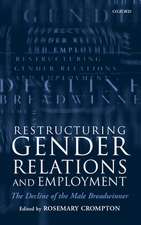Goze: Women, Musical Performance, and Visual Disability in Traditional Japan
Autor Gerald Groemeren Limba Engleză Paperback – 19 mai 2016
| Toate formatele și edițiile | Preț | Express |
|---|---|---|
| Paperback (1) | 261.39 lei 31-37 zile | |
| Oxford University Press – 19 mai 2016 | 261.39 lei 31-37 zile | |
| Hardback (1) | 717.07 lei 31-37 zile | |
| Oxford University Press – 23 iun 2016 | 717.07 lei 31-37 zile |
Preț: 261.39 lei
Preț vechi: 323.89 lei
-19% Nou
Puncte Express: 392
Preț estimativ în valută:
50.02€ • 52.36$ • 41.39£
50.02€ • 52.36$ • 41.39£
Carte tipărită la comandă
Livrare economică 26 martie-01 aprilie
Preluare comenzi: 021 569.72.76
Specificații
ISBN-13: 9780190259044
ISBN-10: 0190259043
Pagini: 334
Dimensiuni: 155 x 231 x 20 mm
Greutate: 0.48 kg
Editura: Oxford University Press
Colecția OUP USA
Locul publicării:New York, United States
ISBN-10: 0190259043
Pagini: 334
Dimensiuni: 155 x 231 x 20 mm
Greutate: 0.48 kg
Editura: Oxford University Press
Colecția OUP USA
Locul publicării:New York, United States
Recenzii
For readers, Goze assumes a general understanding of music theory as well as some familiarity with Japanese music and history. It will, therefore, likely be of most interest to students and scholars of Japanese ethnomusicology. In its pages, they will find many insights into the world of goze and much raw material to explore further.
Notă biografică
Gerald Groemer began his studies of music as a pianist. After earning a Masters of Music and Doctorate of Musical Arts in piano performance at Peabody Conservatory, he entered the ethnomusicology program at Tokyo University of Fine Arts and Music where he earned a PhD in musicology in 1993, the first non-Japanese ever to do so. Since 1998 he has been professor of musicology, ethnomusicology, and Japanese music history at University of Yamanashi in K?fu Japan. He has authored several books on music and cultural history in both Japanese and English, including The Spirit of Tsugaru (2012), a translation Nishiyama Matsunosuke's writings on Edo Culture (1997), and Street Performers and Society in Urban Japan, 1600-1900: The Beggar's Gift (2015). He was awarded the prestigious Koizumi Fumio Prize for Ethnomusicology in 2008.













